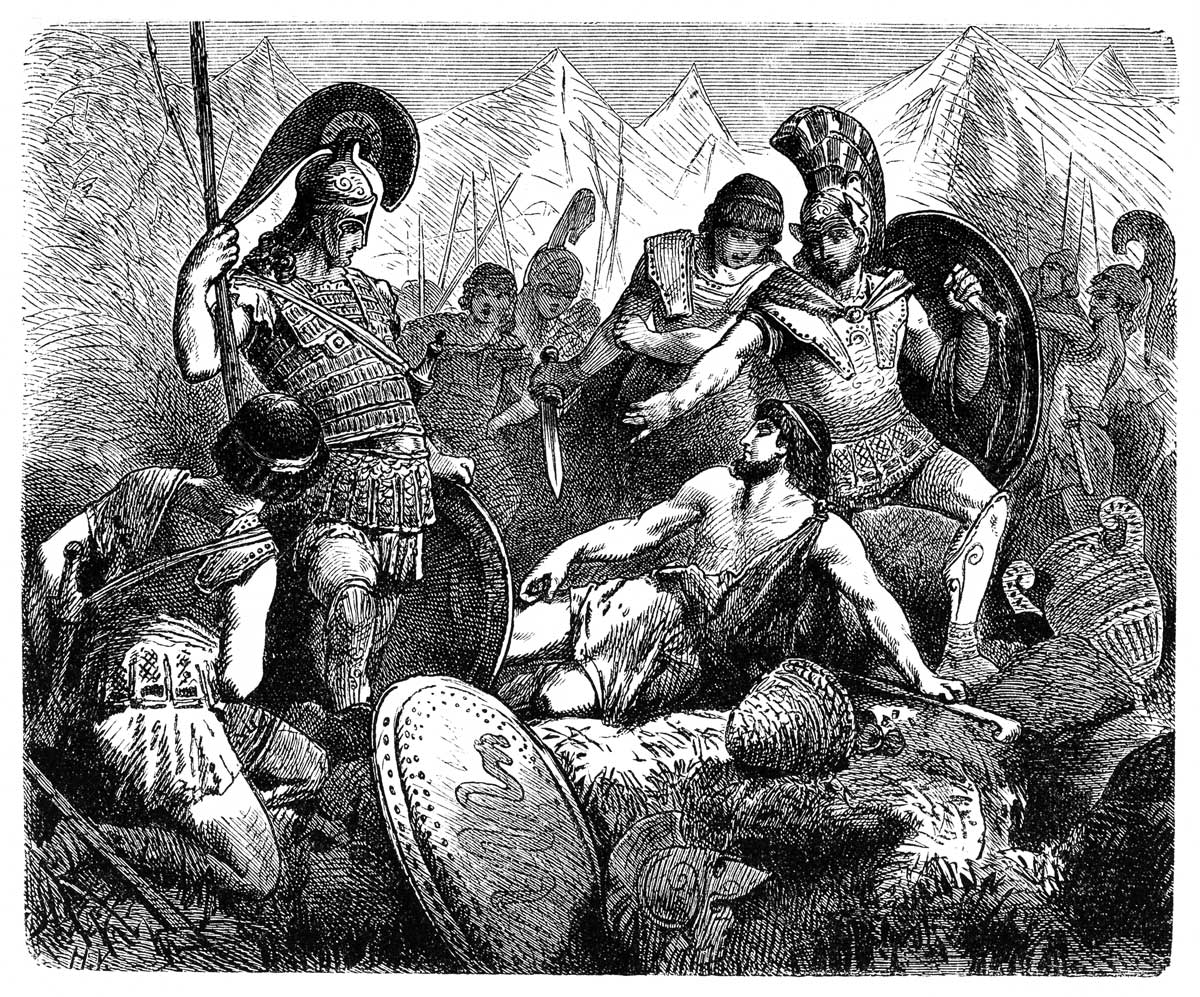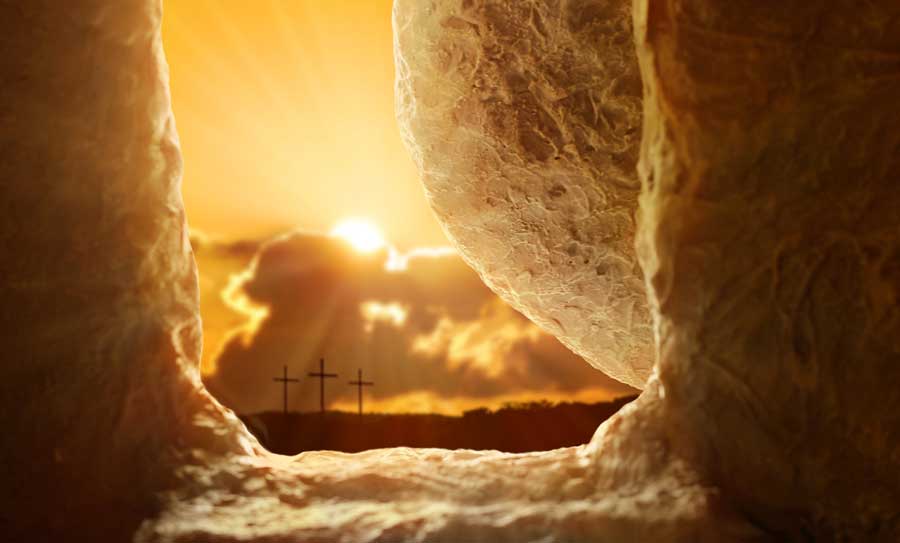Feature
Right Before Our Eyes
Life & Love Are Real Despite Theatrical Illusions
What little I have seen of reality, I owe to the eyes God gave me, and to his grace that opened them when I would have kept them shut.
In our time, Christians attract the hatred of everyone, because they are not wholly given over to unreality. They are the people who refuse to go along with an elaborate illusion. They dash cold water upon it; they sometimes have the temerity to laugh at the prancing, the fakery, the chintz, and the gold paint. They still remember, fitfully enough, the goodness of creation, and still see through, also fitfully enough, man's perennial attempt to be his own god and make for himself a paradise upon earth, flowing in many rivers from a bloody fountain at the center.
Jesus had hard words for the men who sought to kill him, not because he hugged his life close to his heart, but because what they really wanted to do was to kill the truth. The Pharisees boasted that they were children of Abraham, but Jesus gives them an altogether different parentage. "Ye are of your father the devil," he says, "and the lusts of your father ye will do. He was a murderer from the beginning, and abode not in the truth, because there is no truth in him. When he speaketh a lie, he speaketh of his own; for he is a liar, and the father of it" (John 8:44). Jesus has thus set the terms of the contest with a stark severity. He is from the Father, and he speaks what the Father tells him, in order to give men life; they are of Satan, and their speech murders the truth.
They are "hypocrites," a word that we should not rob of its dramatic significance. They are actors in a play staged for the eyes of other people. It is not merely that they like to pray on street corners and let their faces go unwashed when they are fasting, "that they may be seen of men" (Matt. 6:5). Their outward demeanor is a cloak over the inward reality, which is "full of ravening and wickedness" (Luke 11:39), or like the grass above "graves which appear not, and the men that walk over them are not aware of them" (11:44). Consider by contrast the relative shyness of the Lord, who is so often made uncomfortable by the crowds, and regularly retires to the mountains to pray. For mountains are real.
We might put together the two insights into falsehood, and say that Satan was the first actor on a stage, the first, as Milton says,
That practiced falsehood under saintly show,
Deep malice to conceal, couched with revenge.
The Smooth & the Slick
The Lord wishes to be sought; love will not be compelled, and what praise can man merit, if he is under compulsion? Hence our Lord is the Deus absconditus, as Pascal reminds us (cf. Is. 45:15). We must wait upon his revelation in love and respond to it in love. Satan by contrast conceals under the show of care, and entices the response of self-will. "And hath God said?" he asks, pretending to ignorance, and quite literally insinuating—gliding his sinuous way into the bosom (Latin: sinus) of Eve—a malevolence in God, and weakness too, as if God were the actor, putting on a show of greatness to overawe. That lie about God is an absurdity, as the sacred author has shown, because we have already seen God bringing the animals to Adam, as it were submitting to the man's insight into what each of them was and ought to be named.
Adam and Eve are "smooth" in the Hebrew, meaning they are naked, without our wrinkles and ruffles of clothing, while Satan is, in the Hebrew, "smooth" with a slight difference, "slick," "subtle." Adam and Eve have nothing to hide. Satan can do nothing but hide, and it is fit to note the happy coincidence that in the Germanic tongues "hell" (Hölle) is, in its inner meaning, the hollow place, a hiding-hole, a place of concealment.
Our human world is now not a garden thriving with trees, fruit, and "all sheep and oxen, yea, and the beasts of the field; the fowl of the air, and the fish of the sea" (Ps. 8:7–8). It is instead an un-world, a pseudo-world of noise and posing, of the kind of self-showing that hides; it is all "politics," what Malcolm Muggeridge many years ago called the "Legend," bright and hot with stage lights and reporters, mendacious and murderous at once.
Anthony Esolen is Distinguished Professor of Humanities at Thales College and the author of over 30 books, including Real Music: A Guide to the Timeless Hymns of the Church (Tan, with a CD), Out of the Ashes: Rebuilding American Culture (Regnery), and The Hundredfold: Songs for the Lord (Ignatius). He has also translated Dante’s Divine Comedy (Random House) and, with his wife Debra, publishes the web magazine Word and Song (anthonyesolen.substack.com). He is a senior editor of Touchstone.
bulk subscriptions
Order Touchstone subscriptions in bulk and save $10 per sub! Each subscription includes 6 issues of Touchstone plus full online access to touchstonemag.com—including archives, videos, and pdf downloads of recent issues for only $29.95 each! Great for churches or study groups.
Transactions will be processed on a secure server.
more on theology from the online archives
more from the online archives

33.1—January/February 2020
Do You Know Your Child’s Doctor?
The Politicization of Pediatrics in America by Alexander F. C. Webster
calling all readers
Please Donate
"There are magazines worth reading but few worth saving . . . Touchstone is just such a magazine."
—Alice von Hildebrand
"Here we do not concede one square millimeter of territory to falsehood, folly, contemporary sentimentality, or fashion. We speak the truth, and let God be our judge. . . . Touchstone is the one committedly Christian conservative journal."
—Anthony Esolen, Touchstone senior editor













